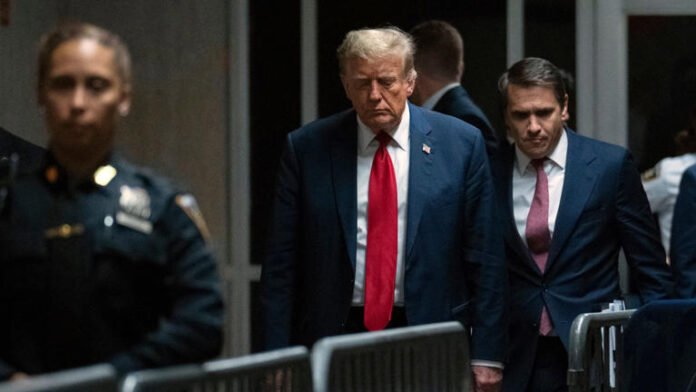The question of whether former President Donald Trump is immune from criminal prosecution hangs in the balance as the US Supreme Court prepares to render its verdict. The outcome of this pivotal decision could have far-reaching implications not only for Trump himself but also for the broader principles of accountability, presidential power, and the rule of law in the United States.
At the heart of the matter lies a fundamental legal question: does the presidency confer immunity from criminal prosecution while in office and even after leaving office? Trump’s legal team argues that as a sitting president, he enjoyed absolute immunity from criminal investigation and prosecution, shielding him from any legal repercussions for his actions. However, critics counter that such a sweeping interpretation of presidential immunity would undermine the principle that no one, not even the president, is above the law.
The case before the Supreme Court centers on an investigation into Trump’s financial dealings and potential tax-related crimes, which began during his tenure as president and has continued post-presidency. The New York prosecutor leading the investigation has sought access to Trump’s financial records, including tax returns and other documents, as part of the probe. Trump has vehemently resisted these efforts, citing presidential immunity as a shield against disclosure.
The legal battle over Trump’s immunity has played out in lower courts, with conflicting rulings that have only added to the uncertainty surrounding the issue. Some judges have upheld Trump’s claims of immunity, citing precedent and constitutional principles, while others have rejected them as overreaching and contrary to the rule of law. Now, the Supreme Court’s decision looms large, promising to provide clarity on this contentious issue once and for all.
The stakes could not be higher, both for Trump personally and for the broader legal landscape in the United States. If the Supreme Court rules in favor of Trump’s immunity claims, it would set a precedent that could significantly limit the ability of prosecutors to hold former presidents accountable for criminal conduct committed while in office. This outcome would raise troubling questions about the balance of power between the executive branch and the judiciary and could undermine public confidence in the integrity of the legal system.
On the other hand, if the Supreme Court rejects Trump’s immunity claims, it would affirm the principle that no one, not even the president, is immune from criminal prosecution for wrongdoing. Such a ruling would reaffirm the bedrock principle of the rule of law and send a powerful message that accountability applies to everyone, regardless of their position or power. It would also signal that the presidency does not confer a license to commit crimes with impunity.
Beyond the immediate legal implications, the Supreme Court’s decision will also have significant political ramifications. Trump remains a polarizing figure in American politics, with a devoted base of supporters who view him as a champion of their interests and a vocal opposition that condemns his actions and rhetoric. The outcome of the case could shape public perceptions of Trump’s legacy and influence his future political aspirations, including the possibility of seeking reelection in 2024.
Moreover, the Supreme Court’s ruling could set the stage for future legal battles involving presidential immunity and the limits of executive power. As the United States grapples with ongoing challenges to its democratic institutions and norms, the court’s decision will serve as a crucial test of the resilience of the rule of law and the strength of the country’s constitutional checks and balances.
In the end, the question of whether Donald Trump is immune from criminal prosecution is not just a legal matter but a moral and ethical one as well. It speaks to the values that underpin American democracy and the commitment to justice and accountability that are essential for its preservation. As the Supreme Court prepares to render its verdict, the eyes of the nation are upon it, awaiting a decision that will shape the course of history for years to come.

